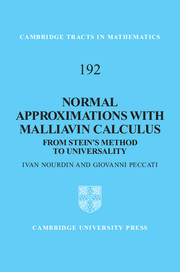Book contents
- Frontmatter
- Contents
- Preface
- Introduction
- 1 Malliavin operators in the one-dimensional case
- 2 Malliavin operators and isonormal Gaussian processes
- 3 Stein's method for one-dimensional normal approximations
- 4 Multidimensional Stein's method
- 5 Stein meets Malliavin: univariate normal approximations
- 6 Multivariate normal approximations
- 7 Exploring the Breuer–Major theorem
- 8 Computation of cumulants
- 9 Exact asymptotics and optimal rates
- 10 Density estimates
- 11 Homogeneous sums and universality
- Appendix A Gaussian elements, cumulants and Edgeworth expansions
- Appendix B Hilbert space notation
- Appendix C Distances between probability measures
- Appendix D Fractional Brownian motion
- Appendix E Some results from functional analysis
- References
- Author index
- Notation index
- Subject index
5 - Stein meets Malliavin: univariate normal approximations
Published online by Cambridge University Press: 05 June 2012
- Frontmatter
- Contents
- Preface
- Introduction
- 1 Malliavin operators in the one-dimensional case
- 2 Malliavin operators and isonormal Gaussian processes
- 3 Stein's method for one-dimensional normal approximations
- 4 Multidimensional Stein's method
- 5 Stein meets Malliavin: univariate normal approximations
- 6 Multivariate normal approximations
- 7 Exploring the Breuer–Major theorem
- 8 Computation of cumulants
- 9 Exact asymptotics and optimal rates
- 10 Density estimates
- 11 Homogeneous sums and universality
- Appendix A Gaussian elements, cumulants and Edgeworth expansions
- Appendix B Hilbert space notation
- Appendix C Distances between probability measures
- Appendix D Fractional Brownian motion
- Appendix E Some results from functional analysis
- References
- Author index
- Notation index
- Subject index
Summary
In this chapter, we show how Malliavin calculus and Stein's method may be combined into a powerful and flexible tool for studying probabilistic approximations. In particular, our aim is to use these two techniques to assess the distance between the laws of regular functionals of an isonormal Gaussian process and a one-dimensional normal distribution.
The highlight of the chapter is arguably Section 5.2, where we deduce a complete characterization of Gaussian approximations inside a fixed Wiener chaos. As discussed below, the approach developed in this chapter yields results that are systematically stronger than the so-called ‘method of moments and cumulants’, which is the most popular tool used in the proof of central limit theorems for functional of Gaussian fields.
Note that, in view of the chaos representation (2.7.8), any general result involving random variables in a fixed chaos is a key for studying probabilistic approximations of more general functionals of Gaussian fields. This last point is indeed one of the staples of the entire book, and will be abundantly illustrated in Section 5.3 as well as in Chapter 7.
Throughout the following, we fix an isonormal Gaussian process X = {X(h): h ∈ h}, defined on a suitable probability space (Ω, ℱ, P) such that ℱ = σ {X}. We will also adopt the language and notation of Malliavin calculus introduced in Chapter 2.
- Type
- Chapter
- Information
- Normal Approximations with Malliavin CalculusFrom Stein's Method to Universality, pp. 89 - 115Publisher: Cambridge University PressPrint publication year: 2012



